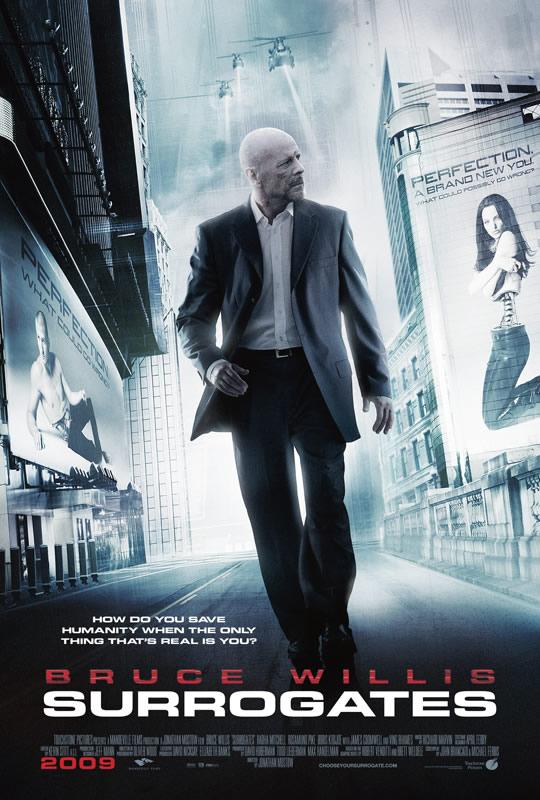Movie Review: Surrogates, more plot needed
October 5, 2009
High-speed chases that end in multiple car crashes, sexy robots that can perform superhuman feats, and drab-looking people that rely too much on technology. That is basically the entirety of the new movie Surrogates, as the movie lacks an original and gripping plot.
In the movie, people live in a world where robotic surrogates — idealized, physically perfect androids– perform all the tasks of daily life, while the humans stay in the safety of their own homes. It is set 14 years in the future, at which point most of the world’s human population is living remotely through their “surries”. The world is ideal: when people live through the surrogates, they are immune from pain, danger, and consequences.
When this utopian society is shocked by the first homicide since the use of surrogates, FBI agent Tom Greer, played by Bruce Willis, is called to the scene to investigate. During the investigation, he uncovers a conspiracy to undermine the surrogate phenomenon and is forced to discard his own surrogate for the first time in years in order to resolve the mystery.
The opening scenes explain how the surrogates have changed the world and how human reliance on technology has made us distant from one another. In this case, the use of surrogates as robotic avatars thrusts the increasing distance between people into harsh relief; instead of communicating with each other through themselves, people opt to speak through mechanical representations of themselves. While this underlying theme of increased reliance on technology is important, it is introduced in Surrogates in such a poor way that there is nothing left for the viewer to reflect on after watching.
Although realistic in almost every other aspect, the robots’ incapability to display any emotion, remaining waxy and stoic throughout the story, detracts from the overall effect. Director Jonathan Mostow seems to accentuate this by deciding to shoot the scenes with surrogates in a harsh, at times almost too bright light, while he shoots scenes with humans in a softer style. While the intention is probably to highlight the perfection of the surrogate world while revealing the true, declining state of humanity, the audience found themselves laughing at the somewhat comical nature of the surrogates.
This basic form of cinematography matches the awkward sub-plots that were sneaked into the main storyline. For example, Greer’s attempts to reconnect with his wife, Maggie (Rosamund Pike), are an unnecessary addition to the plot and are too clumsily executed to be believable. This attempt at adding some realistic emotion to the plot is further undercut by the soundtrack: dramatic music bombards the audience during even the smallest of emotional scenes. In a good movie, the music should be heard but not noticed. Unfortunately, in Surrogates, this was not the case.
The imagery is also a bit clichéd: Mostow throws in a stereotypical car crash, and the inner robotic parts that are revealed whenever a surrogate gets injured have been used multiple times in past sci-fi movies. At times, even the special effects are of mediocre quality. Although the surrogates can perform superhuman feats, like jumping from incredible heights without suffering injury, simple movement such as dancing still appears stiff and mechanized.
As for the acting, Willis does his best to add a more coarse quality to the screenplay but doesn’t quite pull it off. When he first abandons his “surry,” it appears that he will finally bring some much-needed emotion to the plot, but eventually reverts to stoicism, much like his surrogate. The only actor who manages to bring a bit of realism into the film is Rosamund Pike. While her character is externally superficial, the scenes portraying her sensitive, crumbling self are vivid enough to draw emotion within the audience.
As an action film, Surrogates is satisfactory; in fact, there is a little more depth in the movie than in the average action flick. As a science fiction movie, on the other hand, it is merely passable. The idea behind Surrogates is far more interesting than the final composition, and the digression from the main story to focus on the sub-plot leaves most viewers feeling unfulfilled and discontented.
Rather than providing a fresh storyline, this movie offers its viewers a somewhat predictable plot with just the right medley of action scenes and contemporary, futuristic images to keep them relatively content without invoking the kind of thought produced by most good sci-fi films. And, like many films, there is a significant, although overly sentimental, moral at the conclusion. Surrogates is a film that would be good to send your robotic counterpart to, but not worth the ten dollar admission fee.
Surrogates (104 minutes, now playing in most theatres) is rated PG-13 for intense sequences of violence, disturbing images, language, sexuality, and a drug-related scene.


















![“[Building nerf blasters] became this outlet of creativity for me that hasn't been matched by anything else. The process [of] making a build complete to your desire is such a painstakingly difficult process, but I've had to learn from [the skills needed from] soldering to proper painting. There's so many different options for everything, if you think about it, it exists. The best part is [that] if it doesn't exist, you can build it yourself," Ishaan Parate said.](https://harkeraquila.com/wp-content/uploads/2022/08/DSC_8149-900x604.jpg)




![“When I came into high school, I was ready to be a follower. But DECA was a game changer for me. It helped me overcome my fear of public speaking, and it's played such a major role in who I've become today. To be able to successfully lead a chapter of 150 students, an officer team and be one of the upperclassmen I once really admired is something I'm [really] proud of,” Anvitha Tummala ('21) said.](https://harkeraquila.com/wp-content/uploads/2021/07/Screen-Shot-2021-07-25-at-9.50.05-AM-900x594.png)







![“I think getting up in the morning and having a sense of purpose [is exciting]. I think without a certain amount of drive, life is kind of obsolete and mundane, and I think having that every single day is what makes each day unique and kind of makes life exciting,” Neymika Jain (12) said.](https://harkeraquila.com/wp-content/uploads/2017/06/Screen-Shot-2017-06-03-at-4.54.16-PM.png)








![“My slogan is ‘slow feet, don’t eat, and I’m hungry.’ You need to run fast to get where you are–you aren't going to get those championships if you aren't fast,” Angel Cervantes (12) said. “I want to do well in school on my tests and in track and win championships for my team. I live by that, [and] I can do that anywhere: in the classroom or on the field.”](https://harkeraquila.com/wp-content/uploads/2018/06/DSC5146-900x601.jpg)
![“[Volleyball has] taught me how to fall correctly, and another thing it taught is that you don’t have to be the best at something to be good at it. If you just hit the ball in a smart way, then it still scores points and you’re good at it. You could be a background player and still make a much bigger impact on the team than you would think,” Anya Gert (’20) said.](https://harkeraquila.com/wp-content/uploads/2020/06/AnnaGert_JinTuan_HoHPhotoEdited-600x900.jpeg)

![“I'm not nearly there yet, but [my confidence has] definitely been getting better since I was pretty shy and timid coming into Harker my freshman year. I know that there's a lot of people that are really confident in what they do, and I really admire them. Everyone's so driven and that has really pushed me to kind of try to find my own place in high school and be more confident,” Alyssa Huang (’20) said.](https://harkeraquila.com/wp-content/uploads/2020/06/AlyssaHuang_EmilyChen_HoHPhoto-900x749.jpeg)









